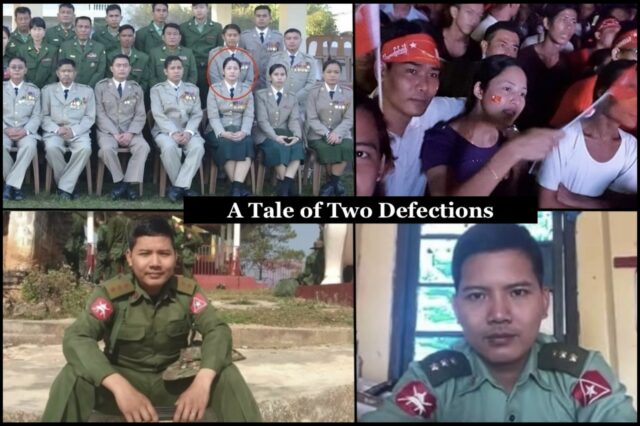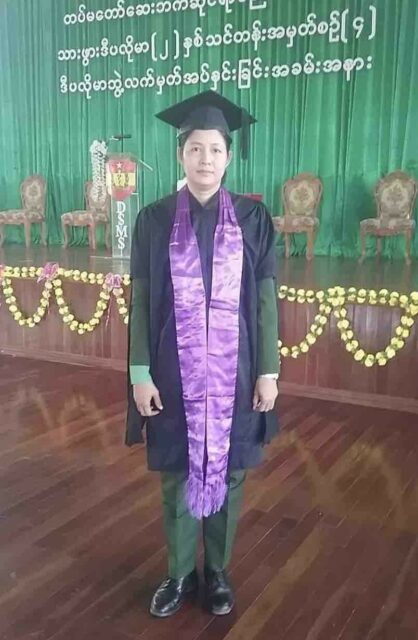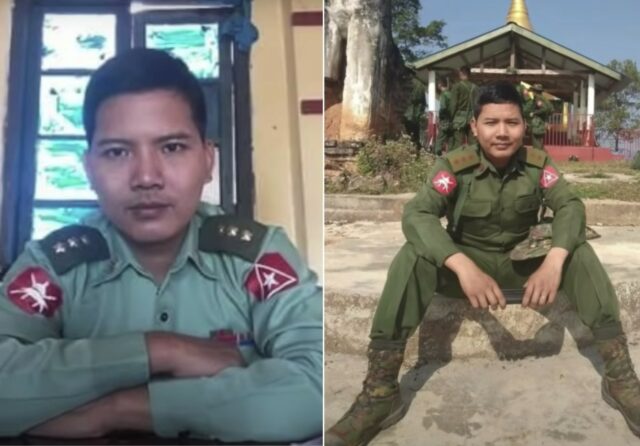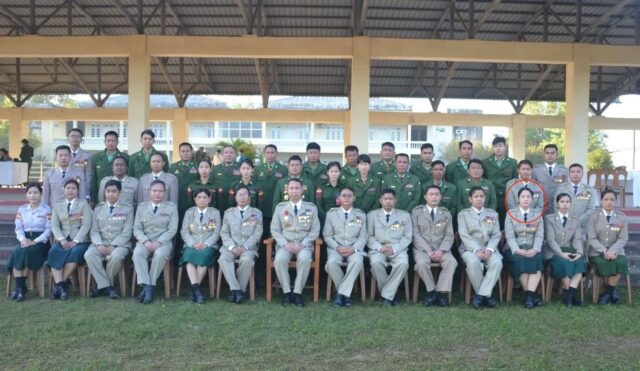From the start, Khin Pa Pa Tun had wanted to take part in the mass civic boycott of the newly installed regime, but didn’t because she knew it would endanger her family.
After all, this wasn’t like 2015, when she and her husband openly celebrated the landslide victory of the now-ousted ruling party, the National League for Democracy (NLD). (They did this despite the fact that their own ballots had been cast by the military on their behalf—almost certainly for the NLD’s chief rival, the Union Solidarity and Development Party.)
Khin Pa Pa Tun had, in fact, tried to resign twice between 2015 and the coup, and each time was denied permission to leave, despite completing the minimum 10 years of service required of those who receive professional training in the military.
The first time was in 2015, when she had finished her post-graduate degree. The second was just months before the coup, after she learned that she had been recommended, without her consent, for an unwanted promotion—something that would only prolong her time in the military. The second rejection reduced her almost to despair, forcing her to bury herself in her work just to cope with the sense that she was well and truly trapped.
Because she didn’t want to take any unnecessary risks with her family’s safety, the coup did not offer her an immediate way out of her dilemma. But when the shadow National Unity Government (NUG) declared last September that it would wage a defensive war against a junta that was behaving like a terrorist organisation, she and her husband knew they would soon have to make a move.
It was not until December, however, that a definite plan began to take shape. With the help of a group called People’s Embrace, established by others who had already defected from the military, Khin Pa Pa Tun could finally see the light at the end of the tunnel.
“Once we decided that the whole family would leave altogether, I felt so free, so happy and relieved,” she told Myanmar Now.
Taking the leap
Aung Myo Htet didn’t have time for elaborate planning. Nor did he have the need for it. All he had to do was wait for the right opportunity, and hope for the best until then.
As a kid, playing gunfights was the height of excitement for Aung Myo Htet. Now, however, he found himself in a real-life situation that filled him with dread. The last thing he wanted was to be forced to shoot to kill.
“Of course, there were a few times I had to fire my weapon,” he said. “But those were just warning shots. I never had to engage in a direct clash with resistance forces.”
It wasn’t just the fact that he had to fight with civilians that made Aung Myo Htet feel so conflicted. Although he was born in Pyay, in northern Bago Region, he had spent his teen years in the Mon State town of Kyaikhto. Because of this, eastern Myanmar, including Karenni State, was familiar territory to him from his pre-military life.
One of the places that he remembered from those years was Moebye, a town in southern Shan State that lies just across the border from the Karenni State capital Loikaw. When he returned there last year, however, he could barely recognise it.
“Most of Moebye had been reduced to ashes. I could still feel the heat from the fires that had burned there. There were only a handful of houses still standing,” he recalled.
This devastation was the result of the military’s response to an attack on a police station by Karenni resistance forces.
“I never imagined that I would ever see something like this in a town. This was just a peaceful little place that I used to pass through when I was younger, and now it lay in ruins. I can’t even find the words to describe it,” he said.
For four long months, he remained on the side of this conflict that treated the lives and livelihoods of civilians with utter disregard. Then, in October, he finally decided to take a leap into the unknown.
That was when he defected to the resistance with the help of an anti-regime group called People’s Soldiers. Thanks to that decision, he is now in a liberated area, where he has been reunited with his wife.
Safe and sound
It took nearly four months for Khin Pa Pa Tun and her family to prepare for their escape. During this time, Thin Aung Htwe had their two children do walking exercises every day to build up their stamina for the difficult journey that lay ahead of them.
When the time finally came, they set off on a summer’s day in April to clear the first hurdle: leaving Yangon undetected.
“I was really worried that someone might recognise me, as I knew a lot of people in the city. I was afraid that someone might come up to me to chat, or ask me where I was going,” Khin Pa Pa Tun recalled.
To avoid this, she wore sunglasses and a hat and avoided facing people in crowds. Sometimes, she said, she even hid behind her children.
Despite her concerns, however, they managed to make it past Yangon’s last checkpoint without incident. But they weren’t in the clear yet.
The final leg of their journey took them through territory that has seen fierce fighting since late last year. There was a very real risk that they could find themselves in the crossfire.
“My husband and I weren’t worried about ourselves, because of our military background, but it was different for our kids,” said Khin Pa Pa Tun.
In the end, however, they made it safe and sound to a place where the military, with the stranglehold it had on all their lives, could no longer reach them.






